Gluten free pita or flatbreads are possible, scrumptious even, with my gfJules Gluten Free All Purpose Flour, I can assure you! You can even make these as beautiful grain-free pita breads with gfJules Nada Flour. Anything is possible with the right gluten free flour!
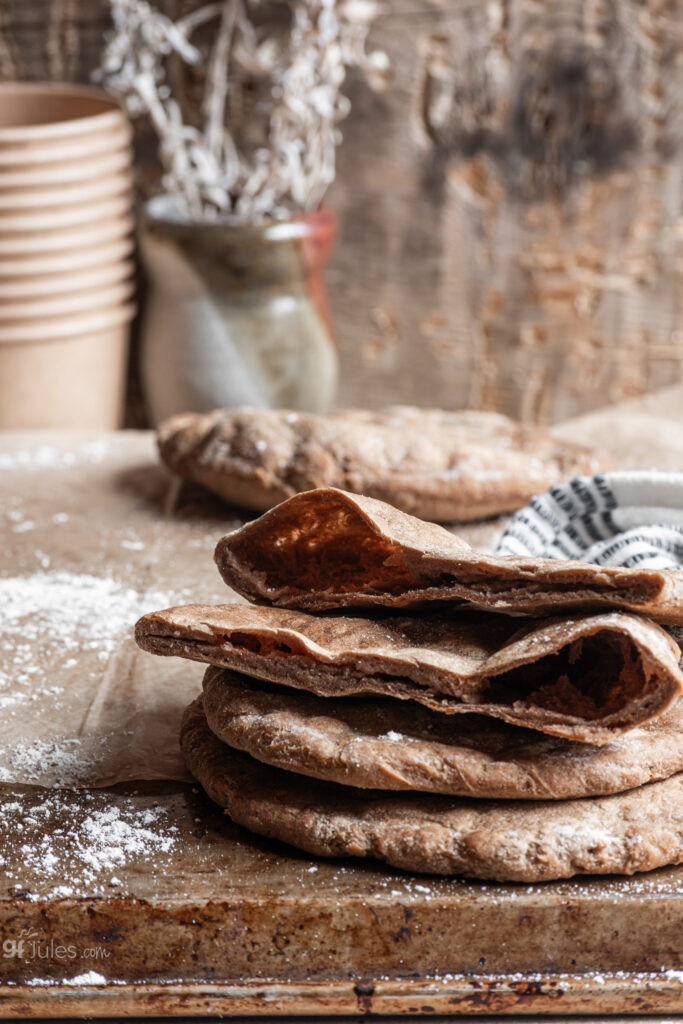
When it comes to grain-free or gluten free pita breads, this recipe is one you’re going to want to bookmark. It’s fast and easy and makes The. Best. Bread!
Yeast-free, dairy-free, egg-free / vegan, and yes, of course, gluten-free, but let’s not focus on what this recipe is missing, since this delicious and versatile bread is soon going to be full of all your favorite yummy fillings!

It holds up to whatever sandwich fixin’s you can throw into it or on it. Just like a good pita should. Or of course, you can use it for dipping.
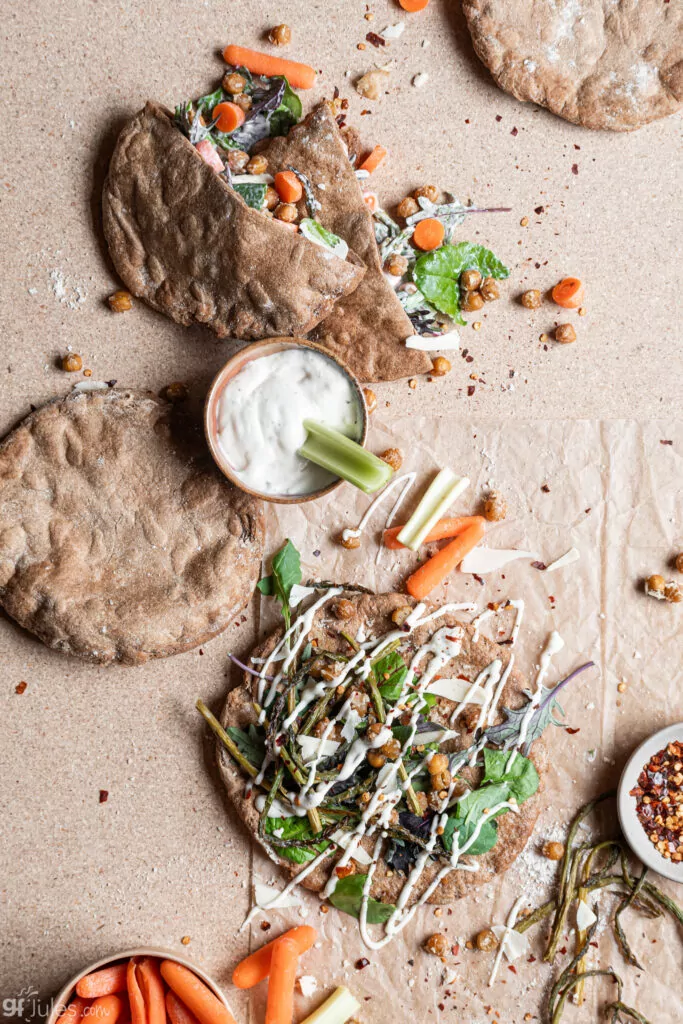
Just look at this beautiful stack. Ready in under 30 minutes — hard to beat that.
In fact, I always wonder why I don’t double the recipe because it’s so worth having these on hand in the freezer at all times for grab and go sandwiches of all kinds.
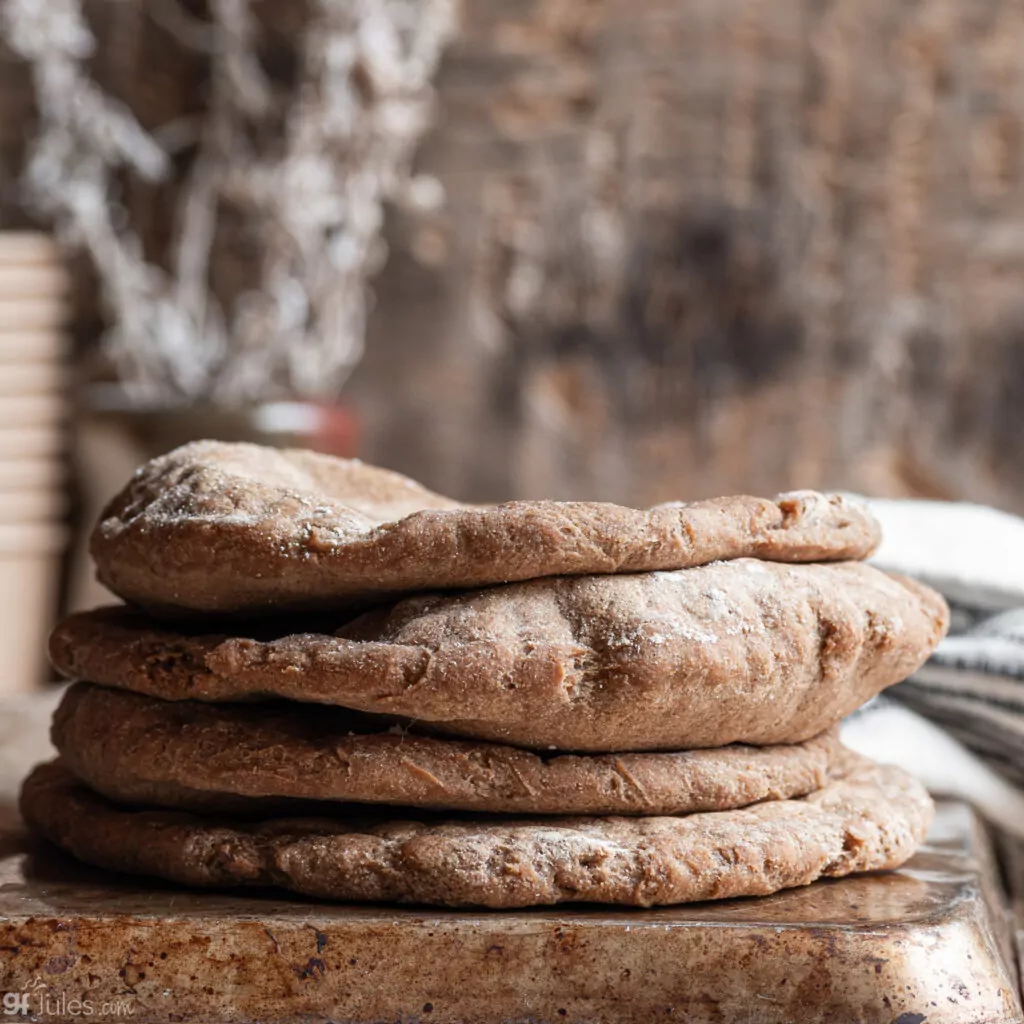
And speaking of sandwiches, remember those “sandwich thins” that used to be so great (back when we could eat wheat)?
Proportions are everything in a sandwich, and thin gluten free pita or flatbreads means more focus on the sandwich and all the goodies stuffed inside. Like fresh homegrown tomatoes … but I digress.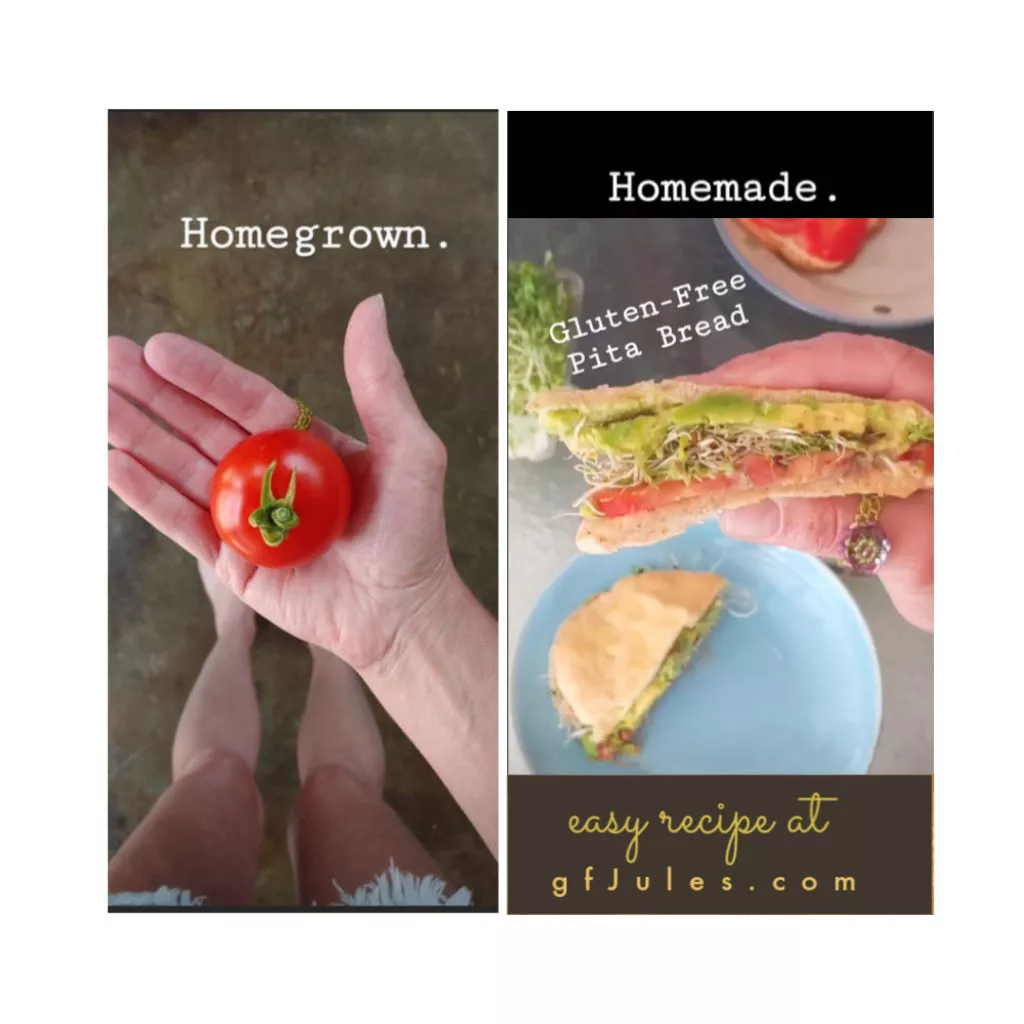
I actually developed this recipe when my oven was broken — a debilitating problem for any baker. I worked on this recipe for weeks, baking it so many times in so many different ways (and so many different ovens -thank you friends & neighbors!), that it has even occupied my dreams. (There’s hardly a dream worse for a baker than nightmares of burned bread!)
I’ve baked this gluten free pita or flatbreads recipe out at temperatures ranging from broiling to 300° F. I’ve tried it in commercial gas heat ovens, electric home ovens and even a gas grill.
Cast iron skillets are another method, believe it or not.
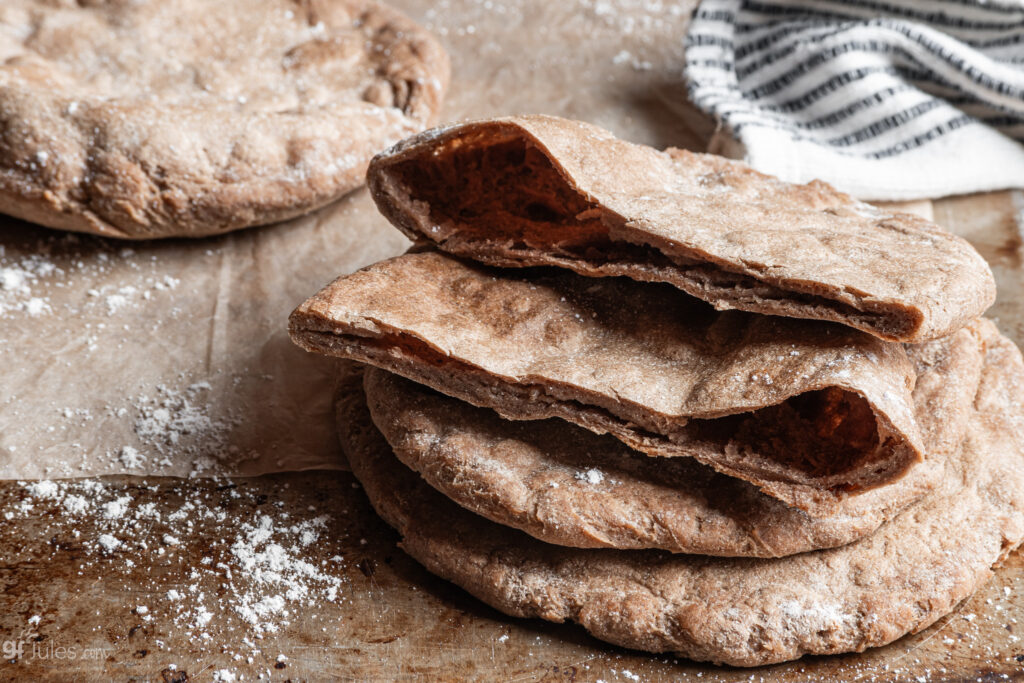
The net result is that, to get these beautiful breads to puff up enough to part the middles for soft pita bread to envelop your favorite sandwich filling, but crisp up enough on the outside to have a slight crunch and a gorgeous lightly browned hue, the dough needs to be mixed as little as possible. And the oven temperature needs to be just right — a perfect 425° F oven should do nicely.
And get those gluten free pitas close to the top heating element for maximum puffiness. I’ve learned that through many trials and errors (the error still taste yummy, too!).
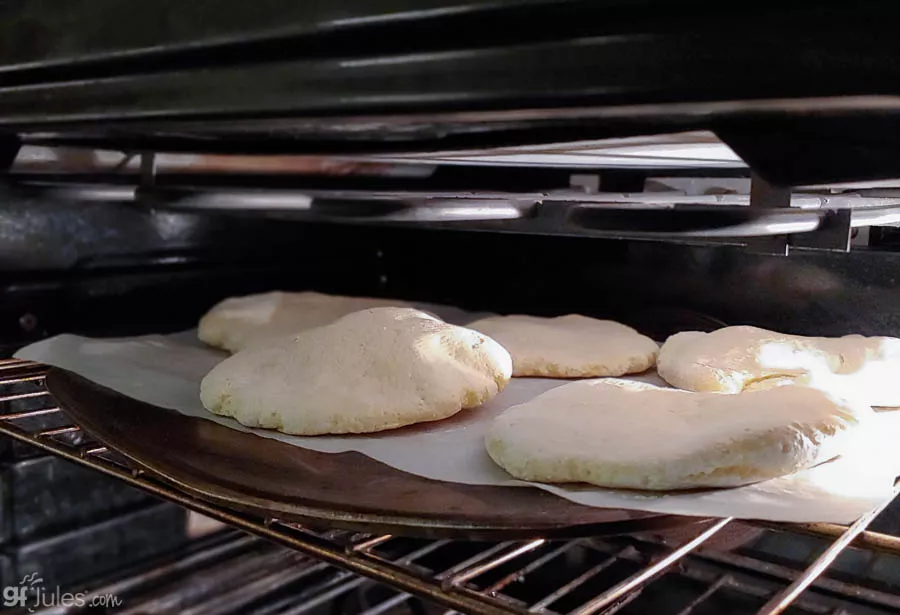
Of course I must sheepishly admit that each time I baked this gluten free pita or flatbreads recipe while I was perfecting it for you, I and all others present ate every single batch, polishing off each one of these breads, regardless of whether we deemed the results “less than perfect.”
Even when these were cooked too long or not long enough or at a not-ideal temperature, they were still amazingly delicious!
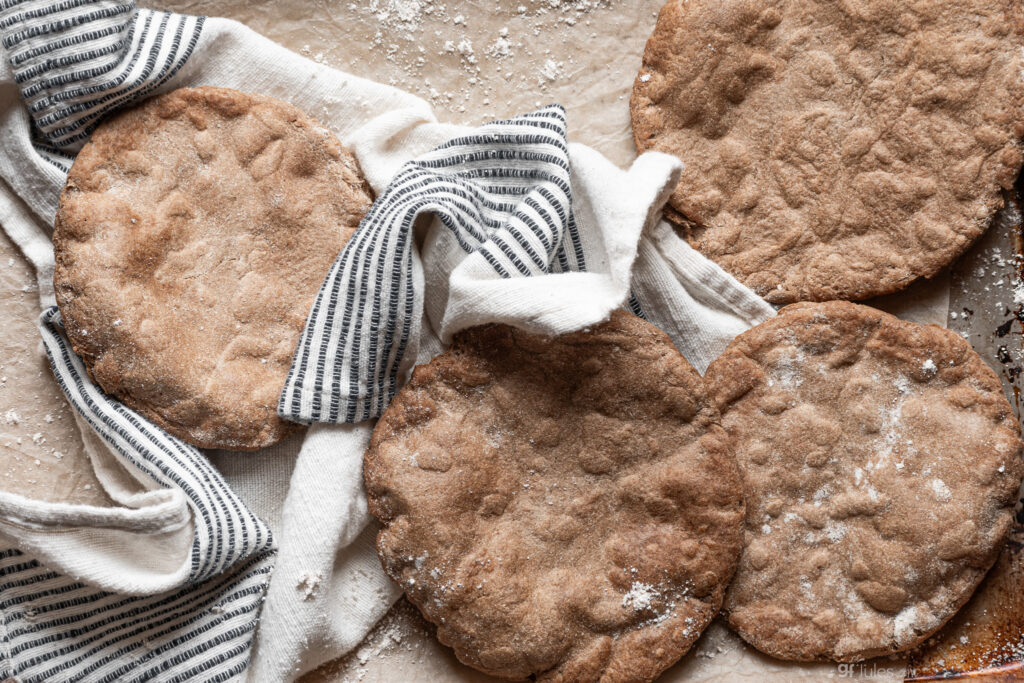
That means that even if your oven isn’t cooperating or they don’t puff up in the middles for you or they’re a touch overcooked, they’ll still be yummy. But don’t wander away from the oven for long, because it is easy to cook them way too much!
Especially because there are so few ingredients in this recipe, it is critical that you use the right ones, namely the gluten free flour specified in this recipe. I hear from folks all the time who try my recipes and use different flour blends and combinations and wonder why they don’t turn out like pictured.
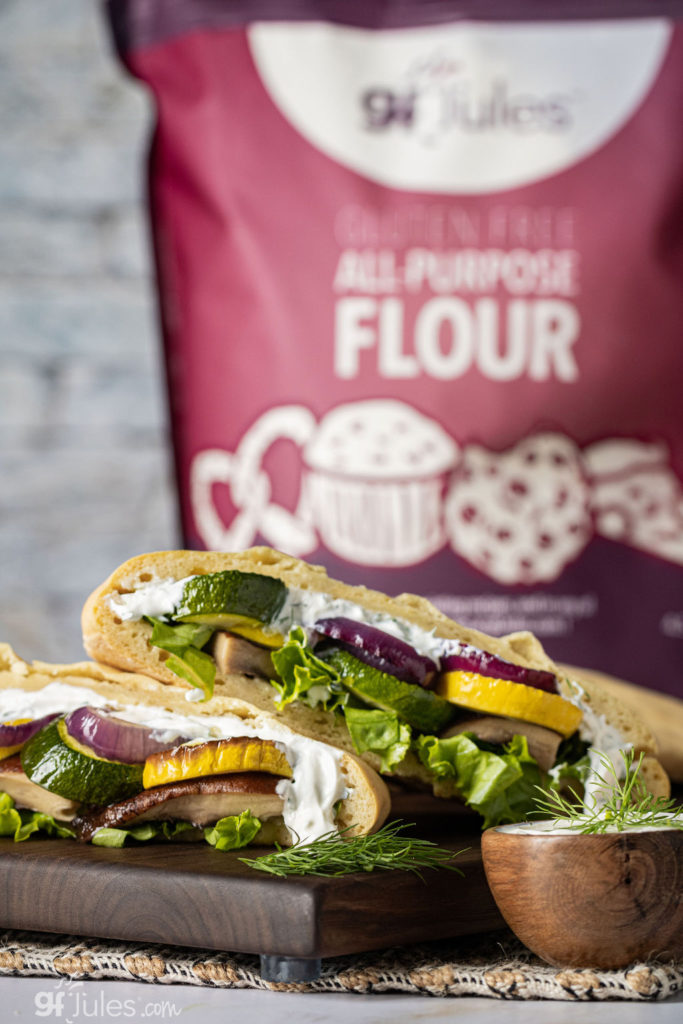
Gluten free flour blends are all very different (click here to read more about different kinds of gluten free flour); my award-winning gfJules™ Flour is fine, light, tasteless and adds stretch to recipes where ordinary gluten free flours fail.
That’s why it’s been voted #1 certified gluten free flour AGAIN in the Gluten Free Awards.
Don’t waste your time with gritty rice flour blends or funky tasting bean flours. Just don’t. If you want these yummy flatbread pitas to turn out right, use the right ingredients and you’ll be a happy baker. I promise!
So don’t be daunted by my trials and tribulations – you can bake this recipe with the right ingredients in a miscreant oven and still come out with pleasing results!
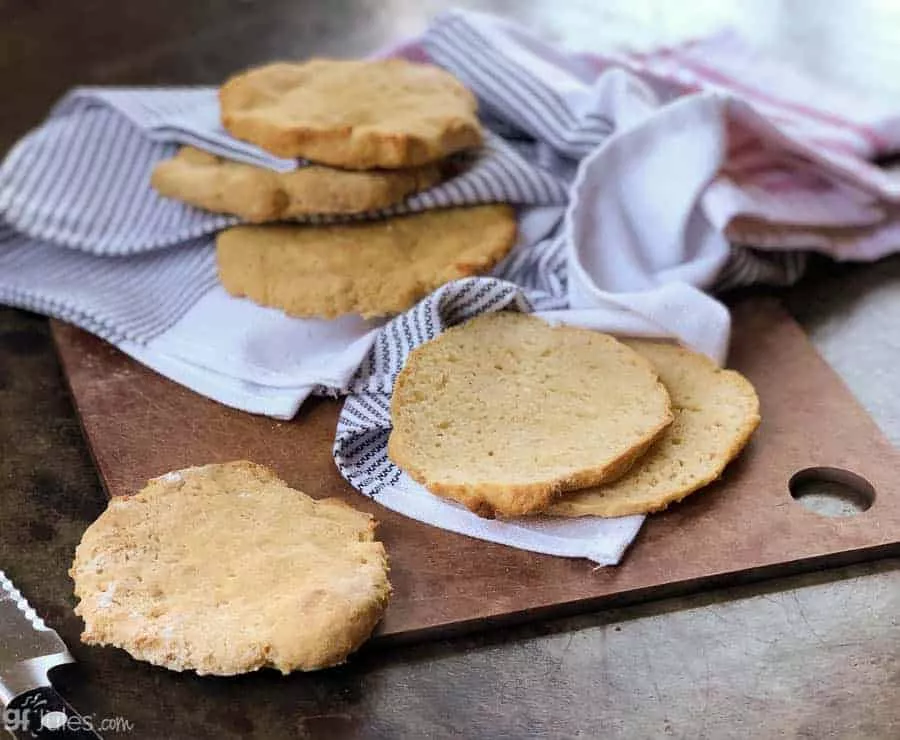
I even baked this gluten free pita or flatbreads recipe at our church with the 2nd grade Sunday School class and we all got our hands in the dough – it’s a wonderful, tactile experience that should be shared!
The recipe makes a wonderful gluten free Communion Bread option, too. Yeast-free and free of the top 9 food allergens plus gluten-free, it’s a Host that works well for intinction, as well. Even more inclusive if you use my grain-free gfJules Nada Flour!
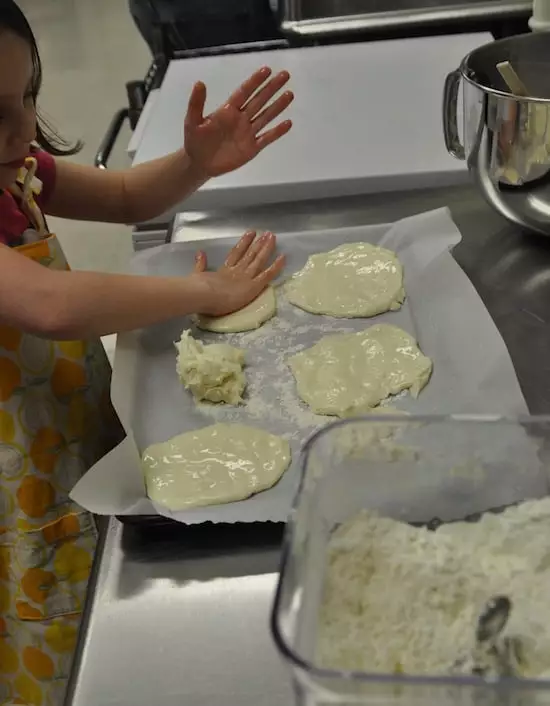
Keep in mind that if 2nd graders can spread this dough into delicious rounds, you can too. There are a few different ways of getting this dough into shape, some a bit less orthodox than others (pun intended) but none is wrong.
Beat it into shape with very well oiled hands or roll in more gfJules Flour and make it look a little neater. Again, no wrong answers.
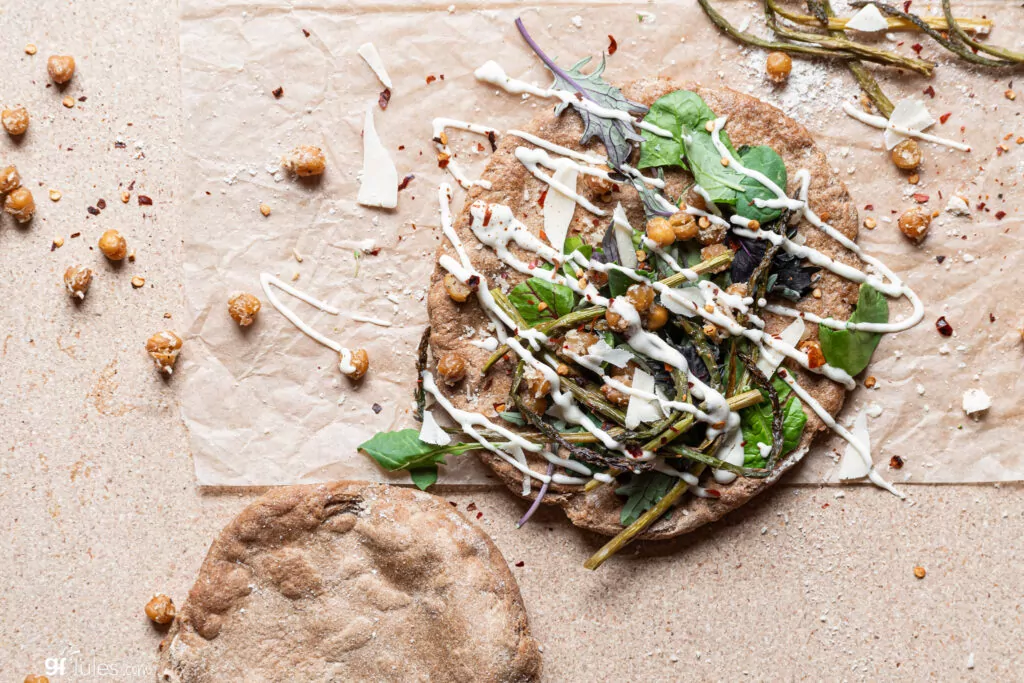
Vegan, yeast-free, dairy-free, and of course, gluten-free or grain-free, there should be nothing keeping you from making this recipe soon and often!
If you’re looking for Gluten-Free or Grain-Free Naan Breads, check out my recipe for that flatbread as well!
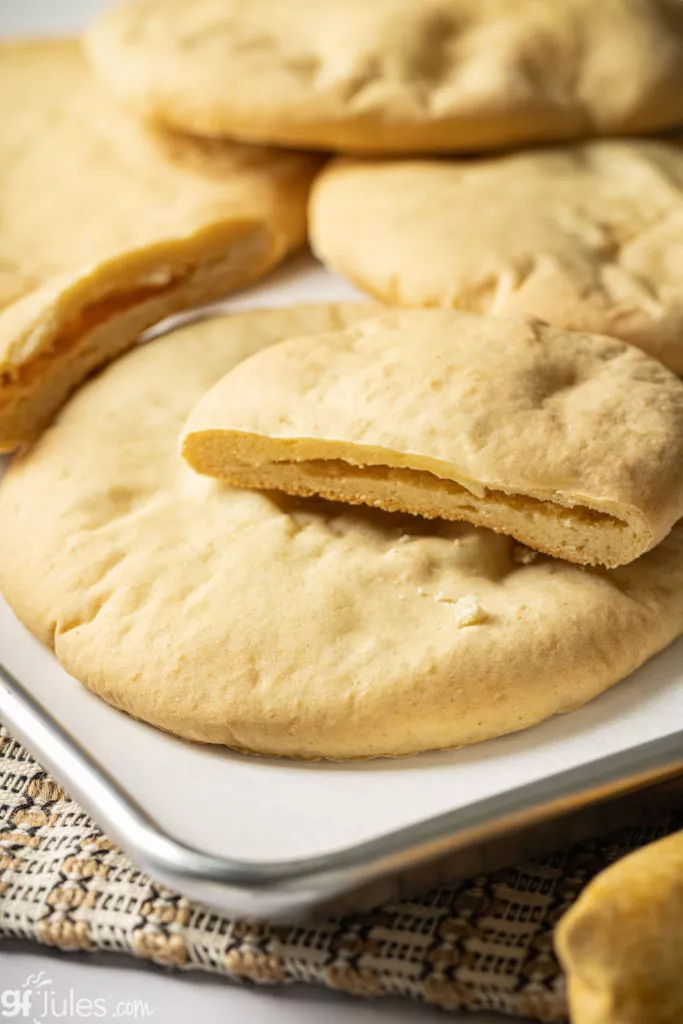
Easy Gluten Free or Grain Free Pita or Flatbreads
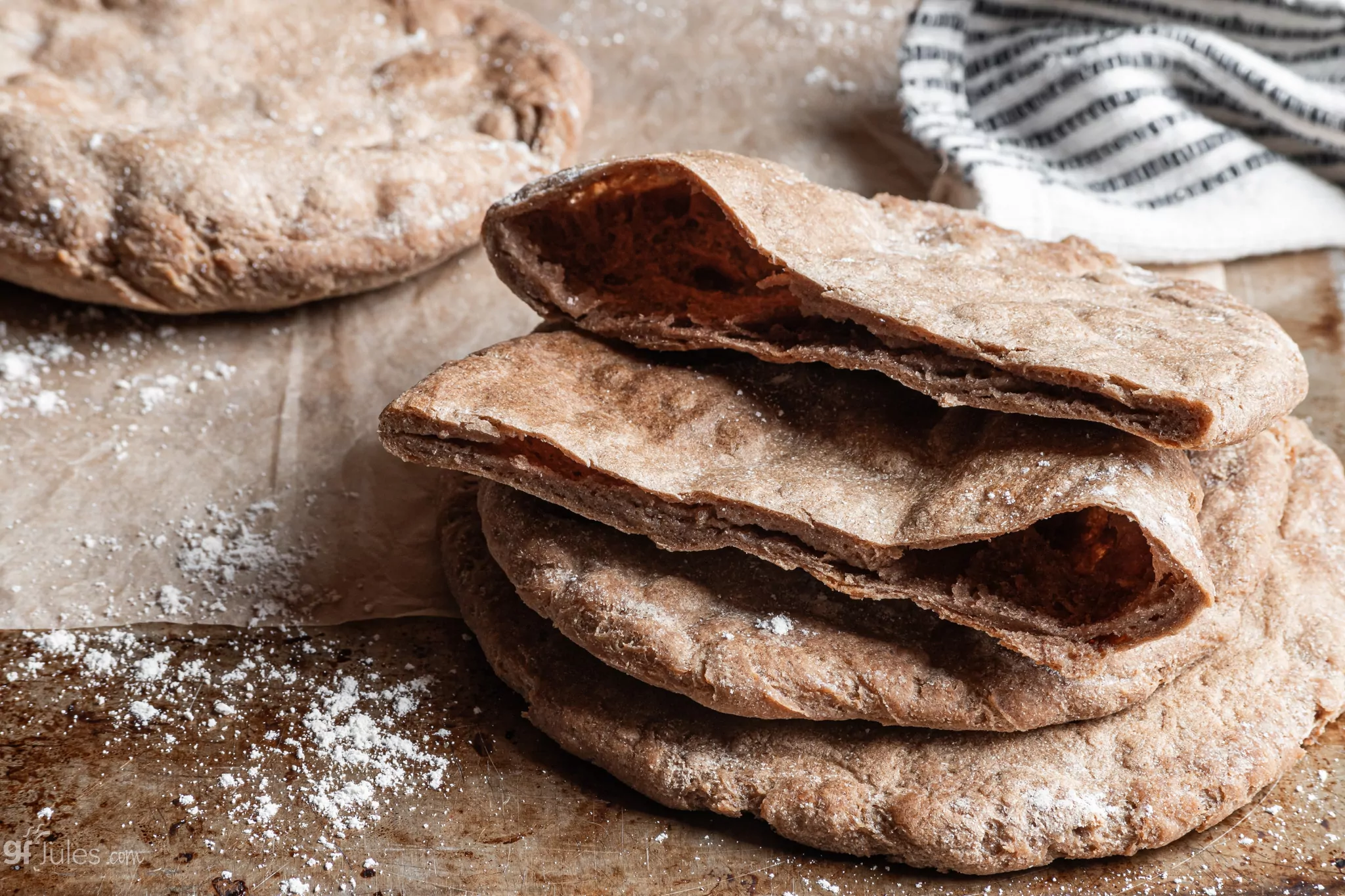
Easy Gluten Free Pita or Flatbreads
Ingredients
- 1 3/4 cups (236 grams) gfJules™ All Purpose Gluten Free Flour OR gfJules grain-free Nada Flour (192 grams)*
- ¼ cup (16 grams) instant plain gluten-free mashed potato flakes (Idahoan® Original Mashed Potatoes; or Edward & Sons™ Organic)***
- 2 tsp. baking powder
- 1/2 tsp. baking soda
- 1/2 tsp. coarse sea salt
- 1/4 tsp. fine sea salt
- 3/4 cup + 2 Tbs. warm milk (dairy or non-dairy soy, coconut, almond, etc.)
- 1/4 cup warm yogurt (dairy or non-dairy soy, coconut, almond, etc.) OR 1/4 cup milk
- 1 Tbs. olive oil vegetable oil or coconut oil (melted)
- Additional oil to brush on tops
Instructions
- Preheat oven to 425° F.
- Place baking stone or metal baking sheet in oven while it is preheating. It should be on one of the upper-most racks, but not the very closest to the top of the oven.
- Whisk the dry ingredients together in a large bowl. Warm milk and yogurt, then add with oil to the bowl and blend, just until integrated.
- Mix until the dough pulls away from the sides of the bowl. If needed, add an extra 1 tablespoon or so of milk, to help the dough to hold together well; if the dough isn't holding together and pulling away from the sides of the bowl, it won't hold together when pressed into rounds, so be sure enough liquid is added at this stage. The goal is for the dough to hold together and be slightly sticky but not wet; not dry or crumbly at all.
- Sprinkle a dusting of my gfJules™ Flour or Nada Flour onto a pastry mat or clean counter. Roll the dough in a small amount of gfJules Flour to keep it from sticking. Gently roll into a wide log and cut into 5-6 equal sized portions.
- Roll each portion in a small amount of gfJules Flour and lightly roll out in all directions to a thickness of about 1/4 inch -- no thinner, and it does not need to be even thickness; some unevenness leads to more puffiness in the baked out breads. Transfer to a piece of parchment dusted with more gfJules Flour.
- Repeat with remaining dough. Brush the tops with oil and slide parchment onto hot stone or baking sheet that has been preheating in the oven.
- Alternatively, scoop out equal portions of dough onto parchment and spread with well-oiled hands, pressing out with the palms of your hands to an uneven thickness of around 1/4 inch. Slide parchment onto hot pan.
- I recommend monitoring this recipe in your oven the first time you try it. Bake for 10 minutes, OR until the breads are puffing up and browning slightly. Flip to the other side and bake for an additional 3-4 minutes. (You may also pan saute the breads lightly to brown the high points like traditional naan baked in a tandoor oven.)
- If you tear open one of the breads, it should be fully cooked and have some pockets of air; it should not be gummy or look uncooked inside. If it is gummy or not fully cooked, return to the oven and monitor until fully cooked. That being said, these breads may appear slightly gummy when hot out of the oven; let them cool for at least 5 minutes before tearing or cutting so the structure of the breads will set first. Note the times and temperatures for your oven, so that next time you bake these flatbreads, you will know what produces the best results with your oven.
Video
Notes
** Please keep in mind that nutrition information provided is per serving, which may vary. While we have taken care to provide you with the most accurate nutritional values possible, please note that this information may differ significantly depending on the exact ingredients and brands that you choose to use to make this recipe. Additionally, where options are given for ingredients, the resulting calculation may include all ingredient options instead of only one per line, skewing the totals significantly.
I can’t wait to hear what you think!
Pin this recipe for later!
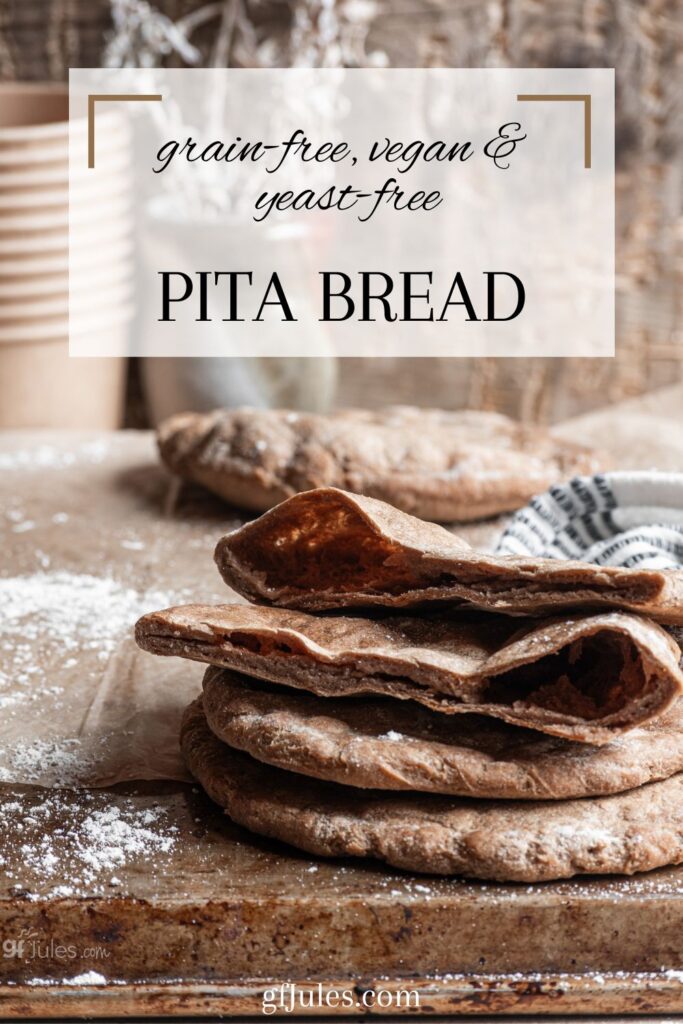
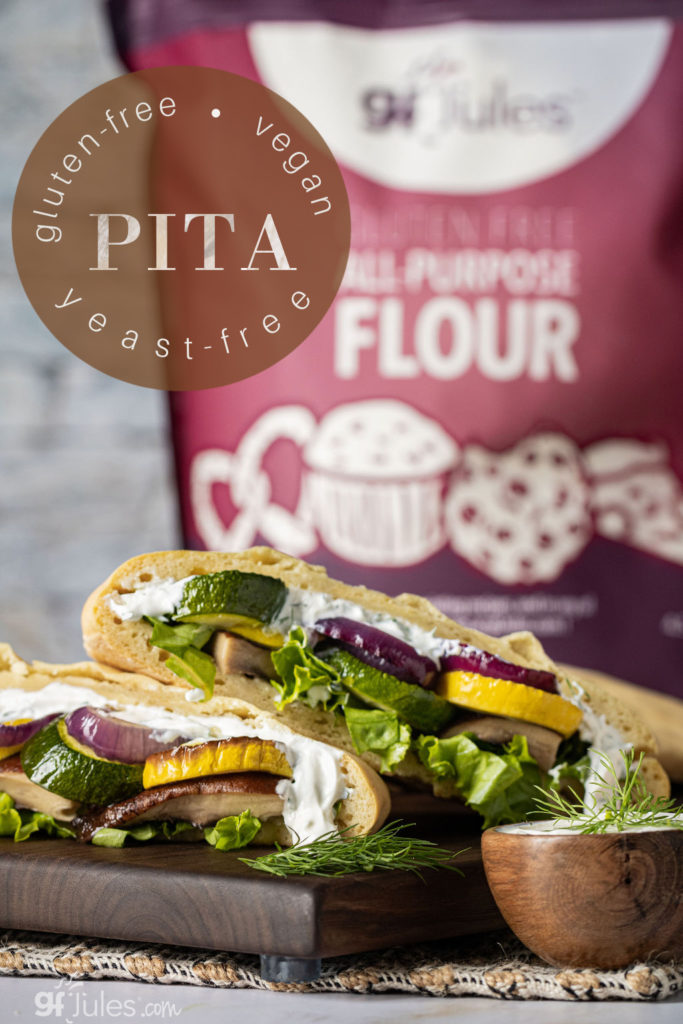
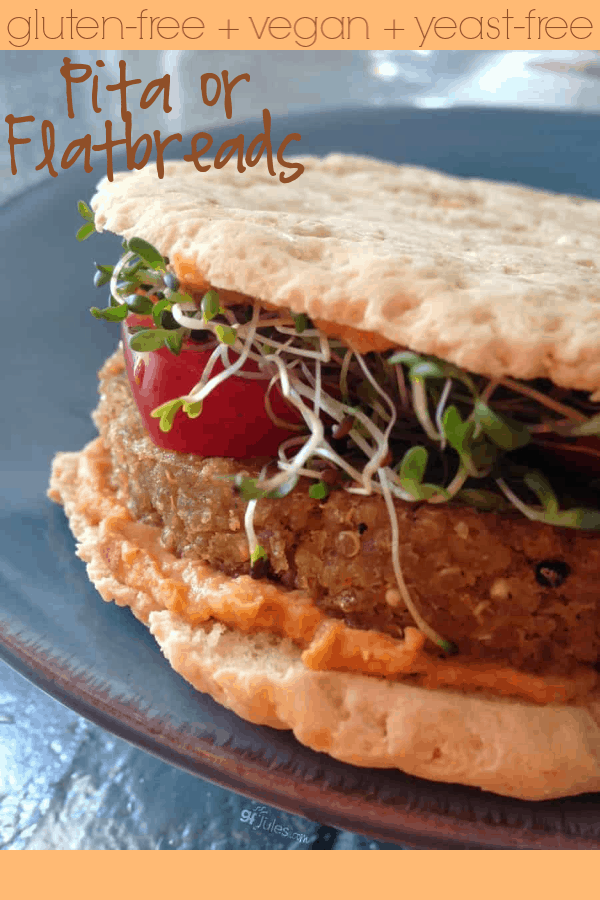
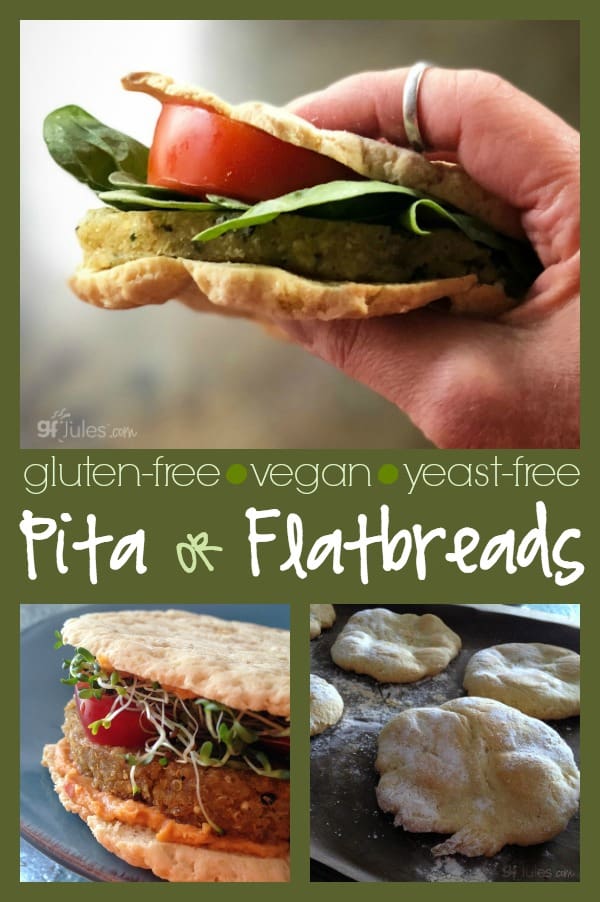
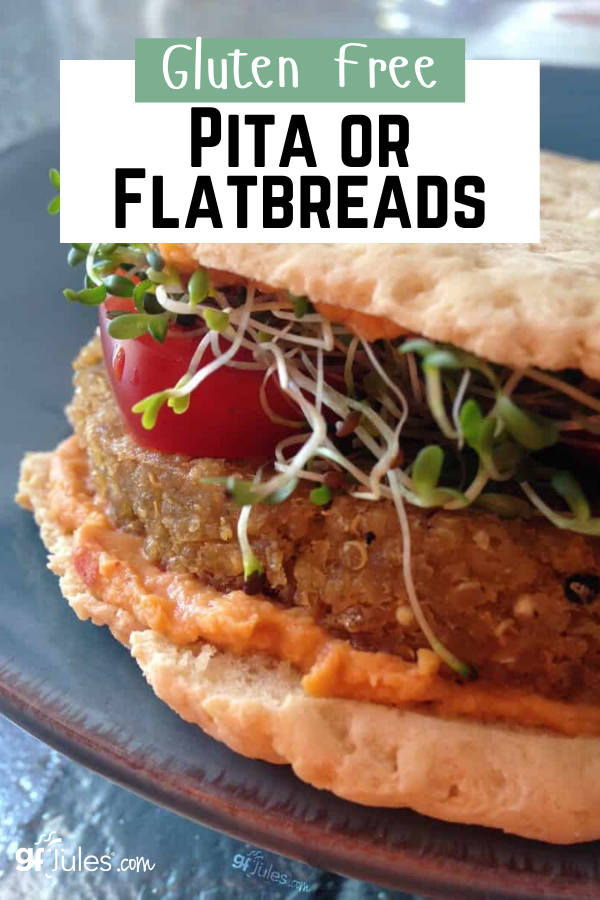
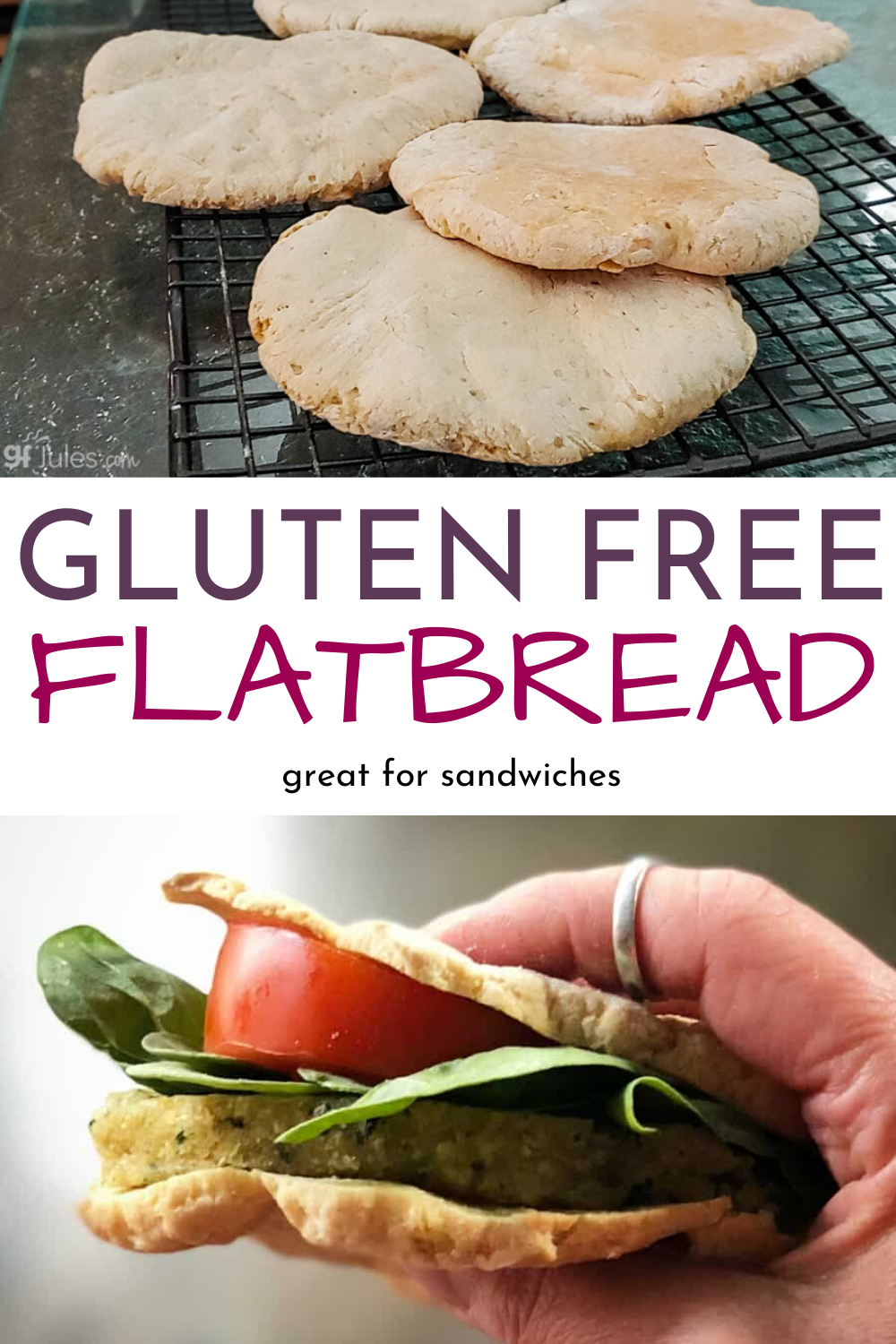
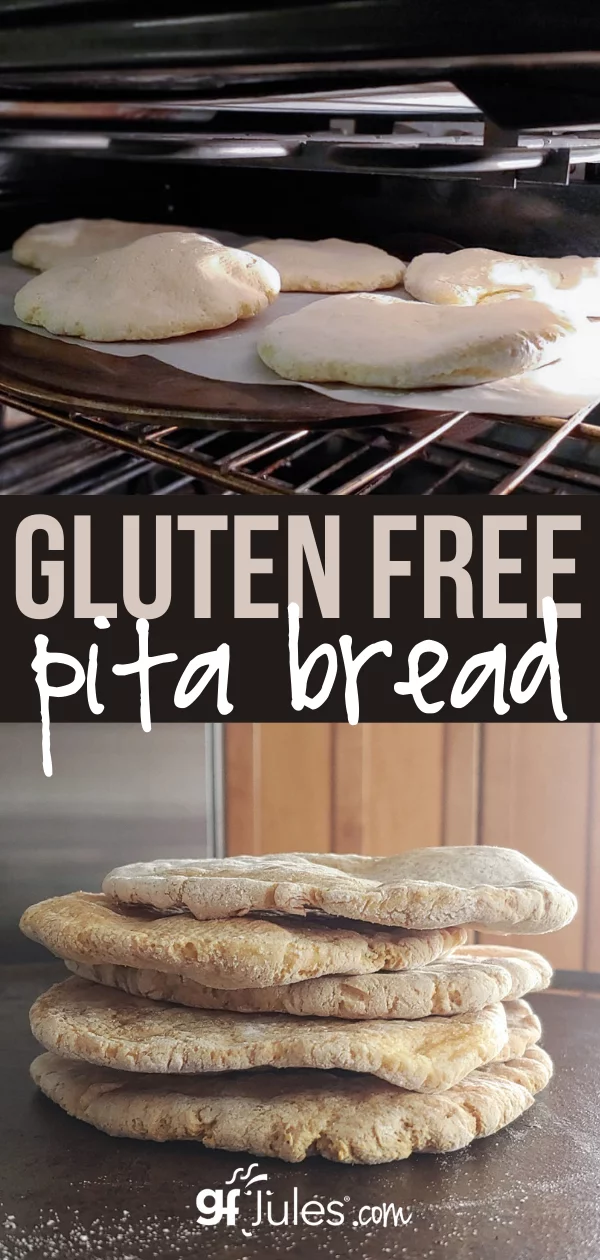
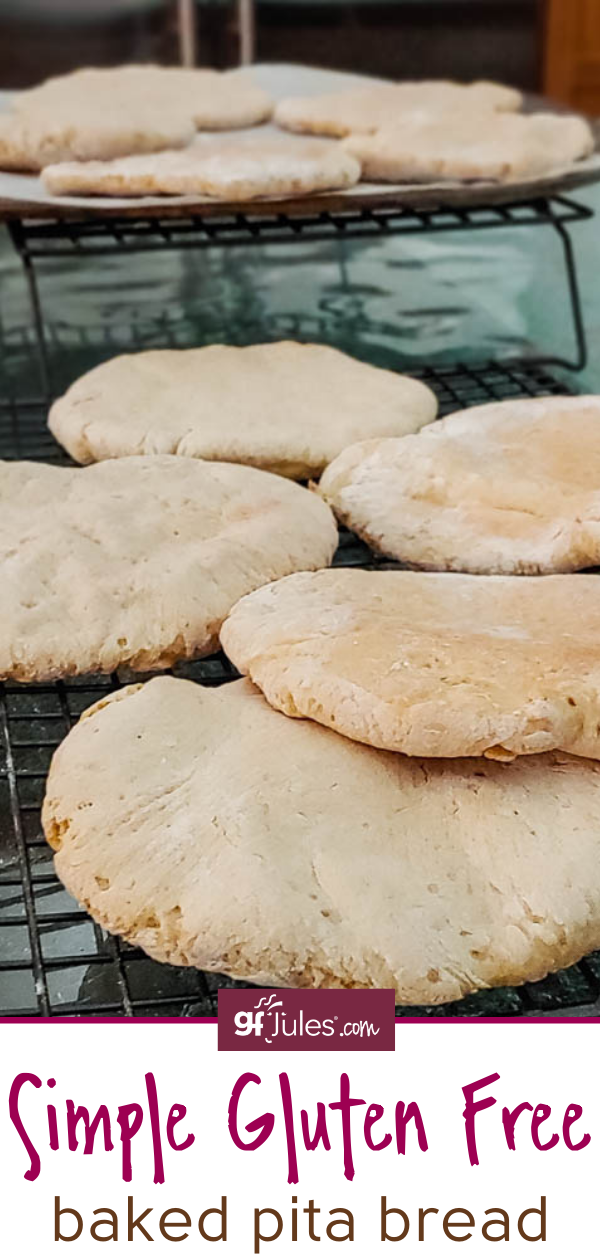

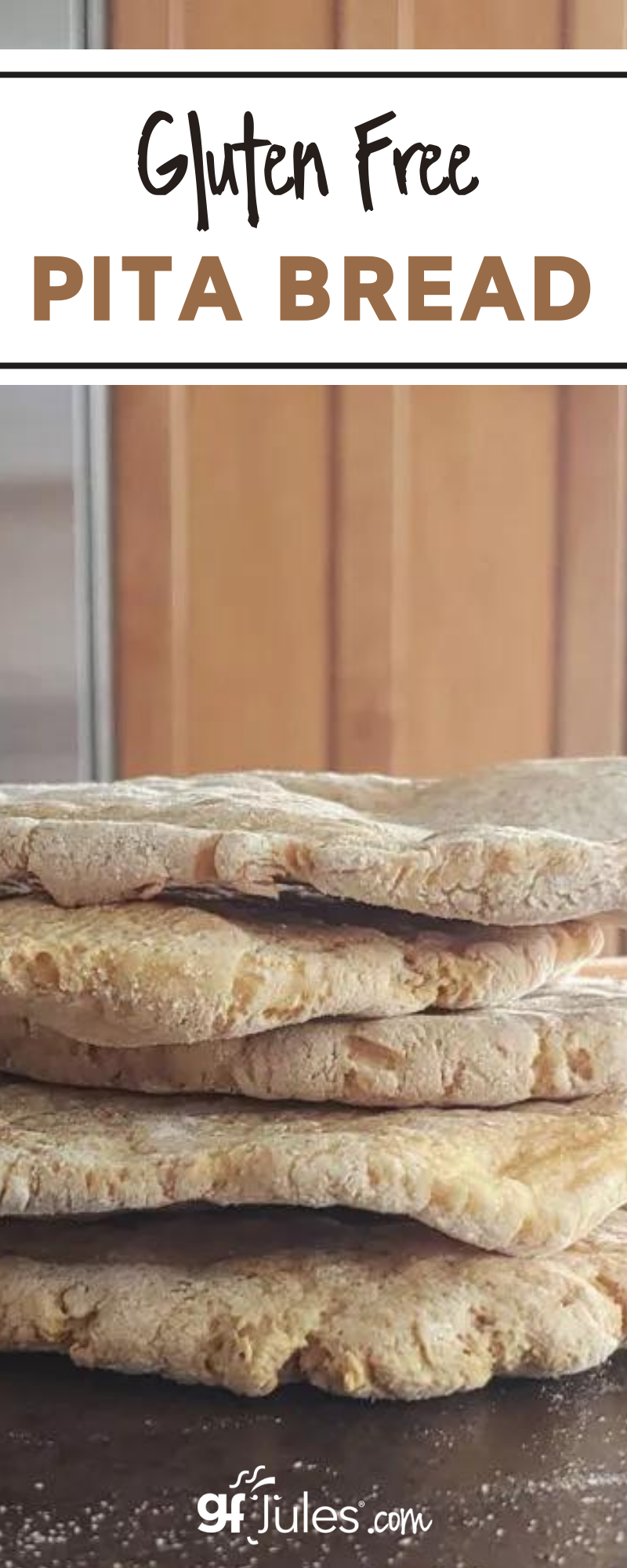
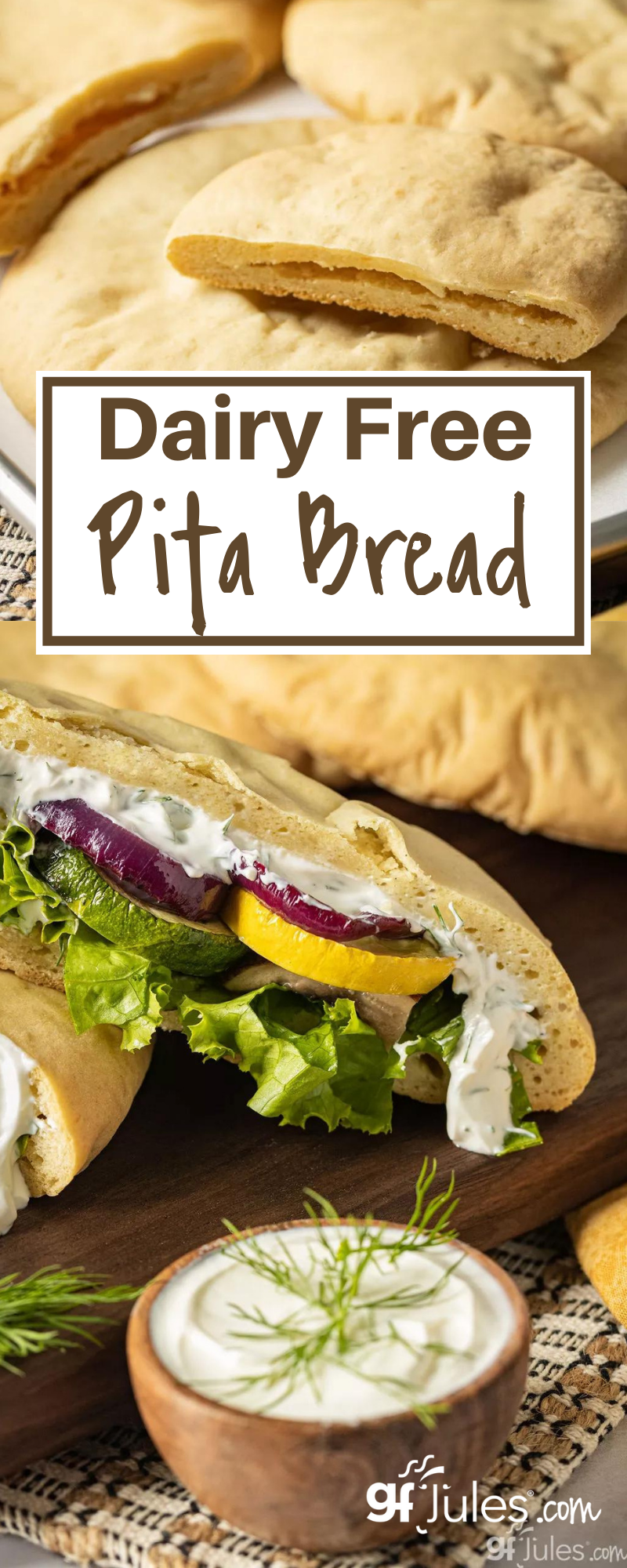


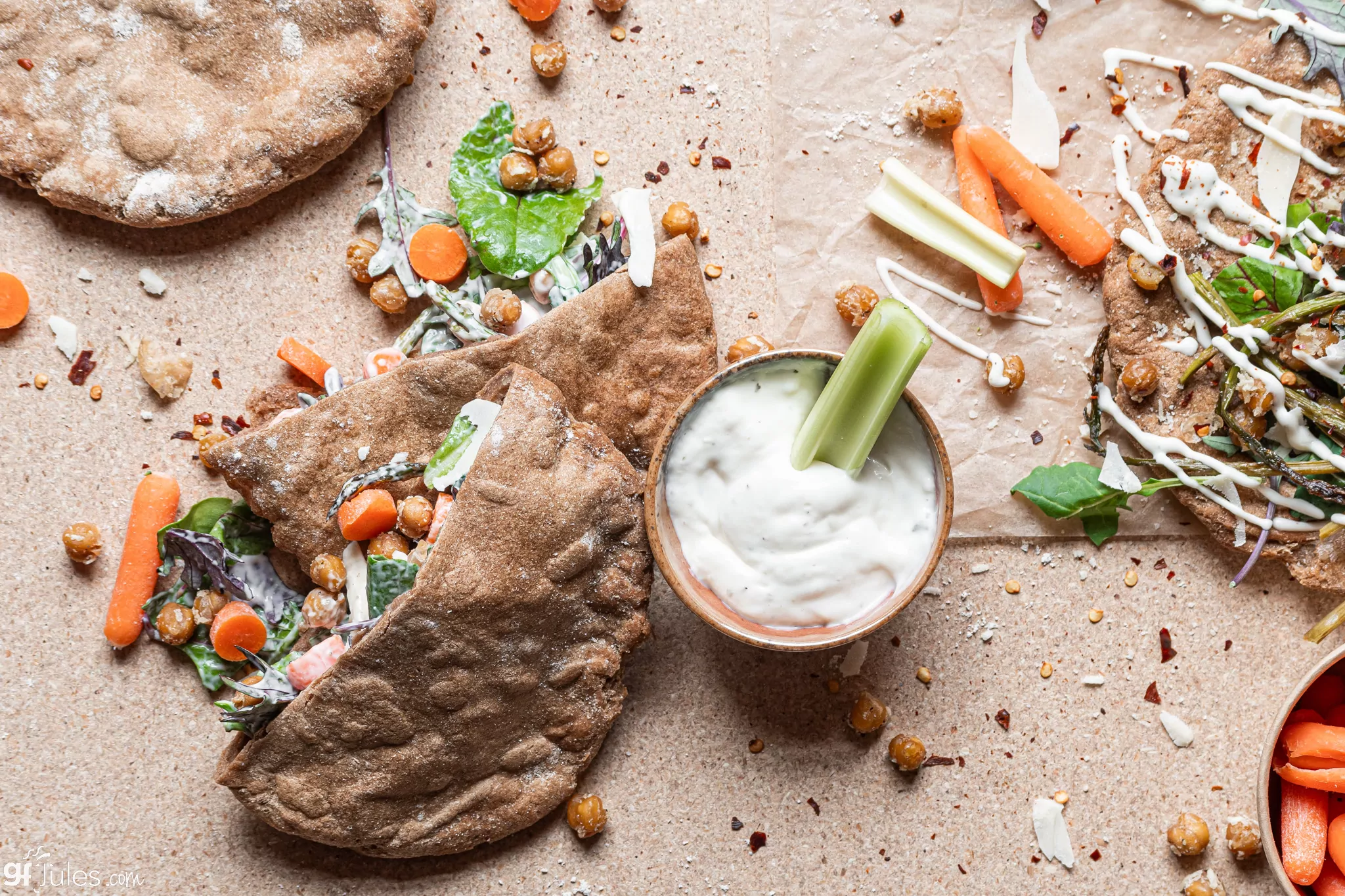
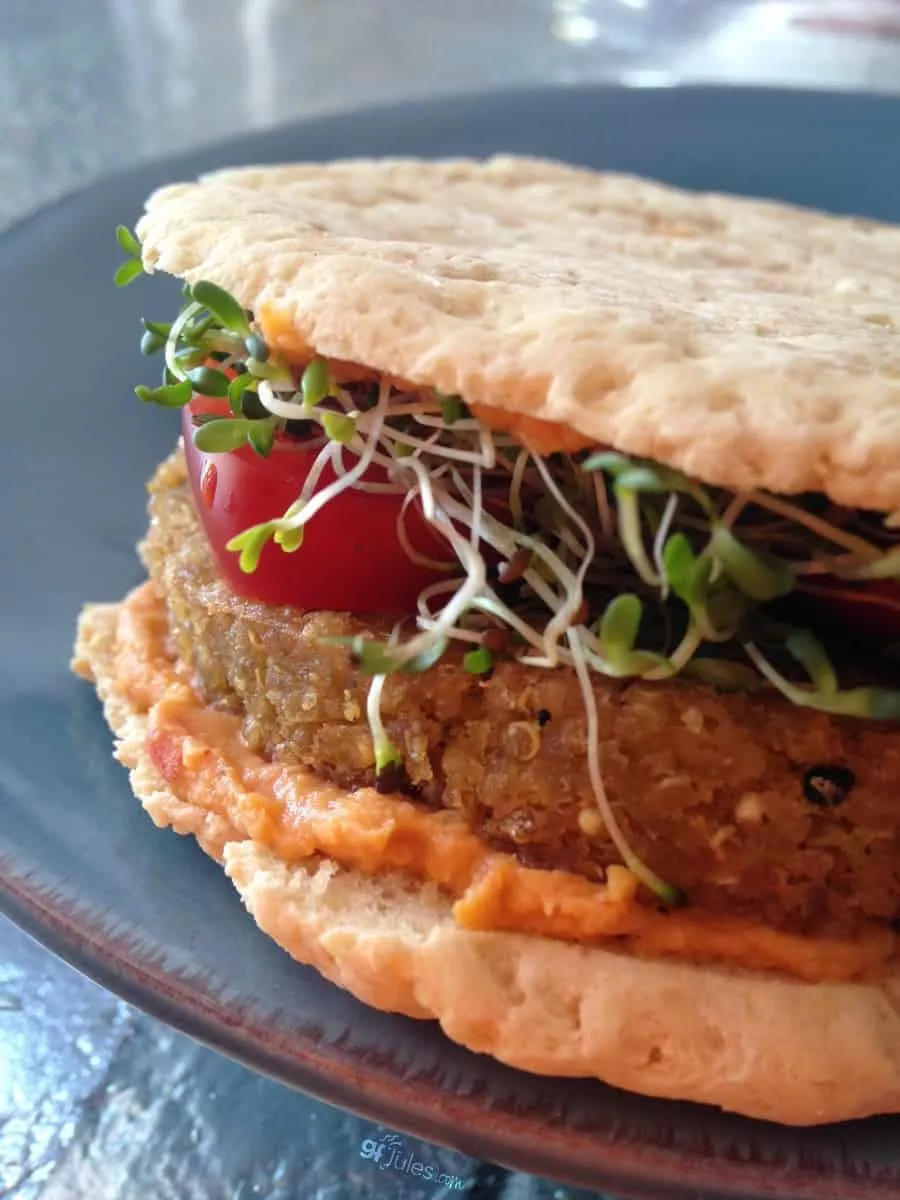
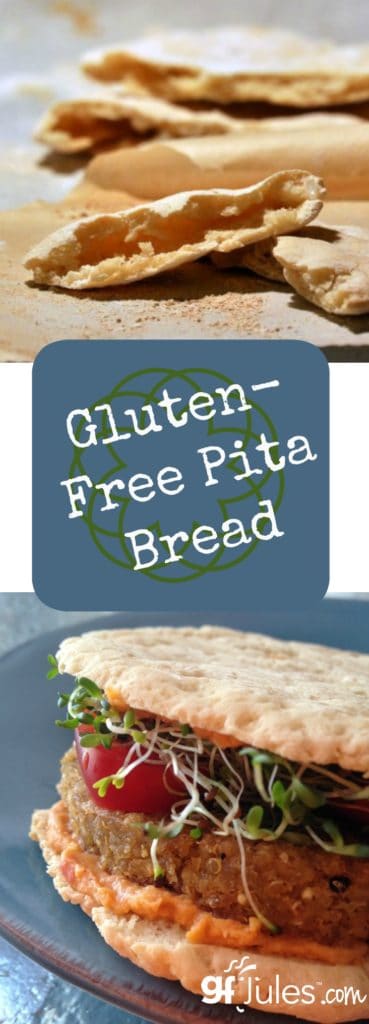
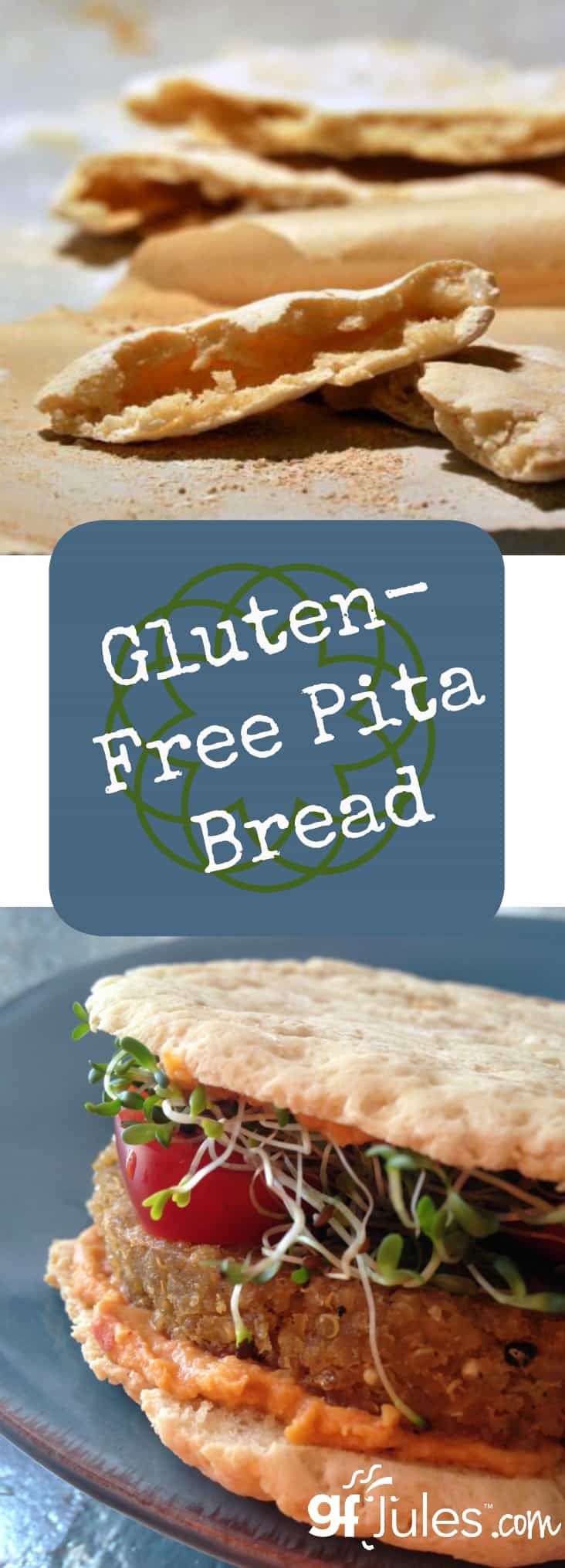











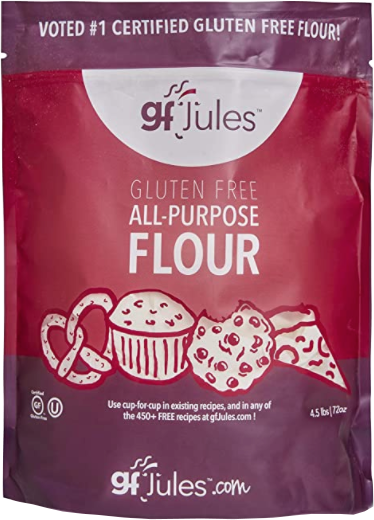
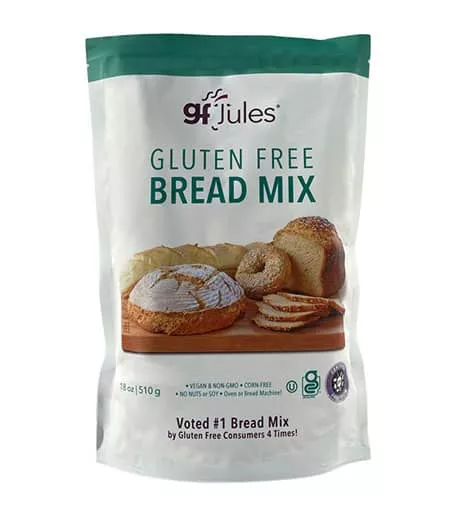
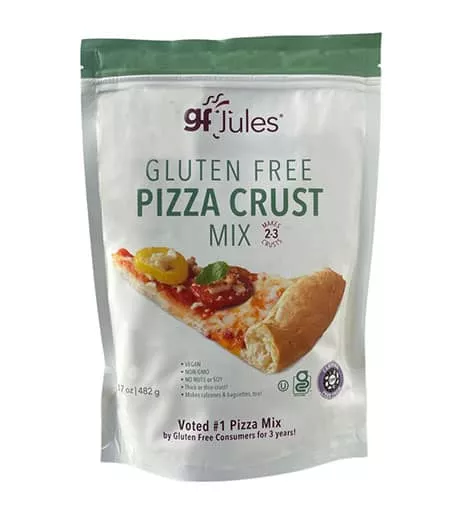
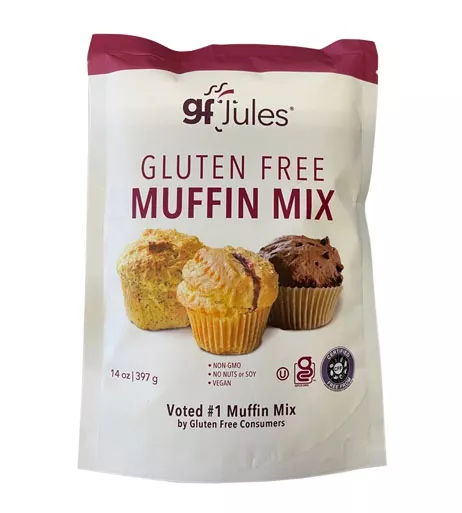
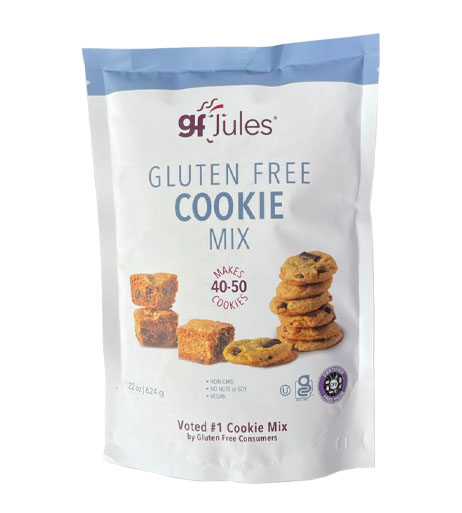

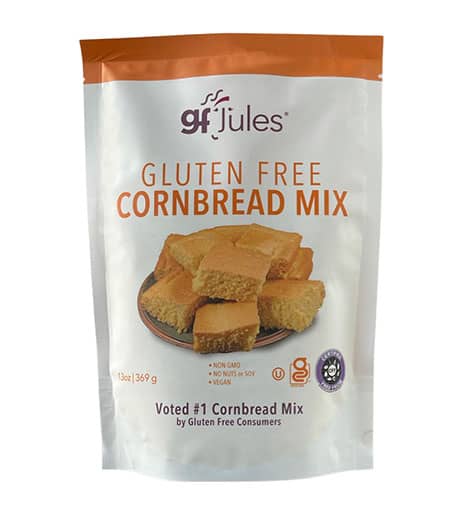



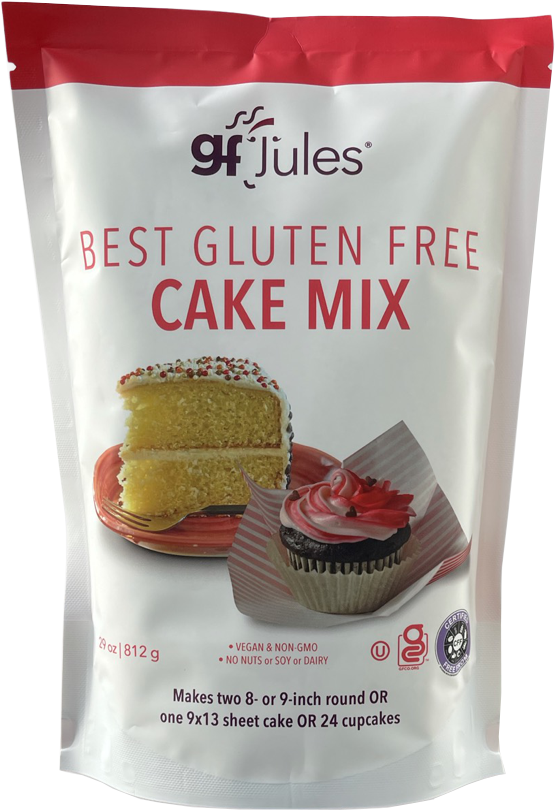
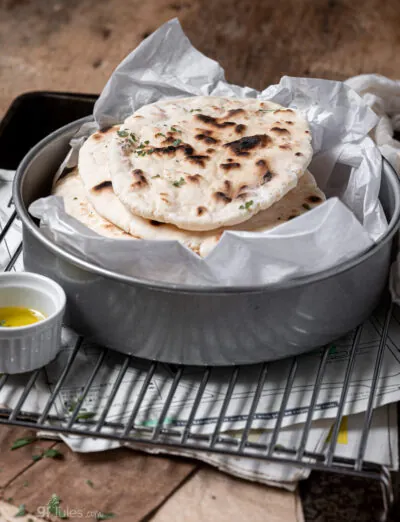
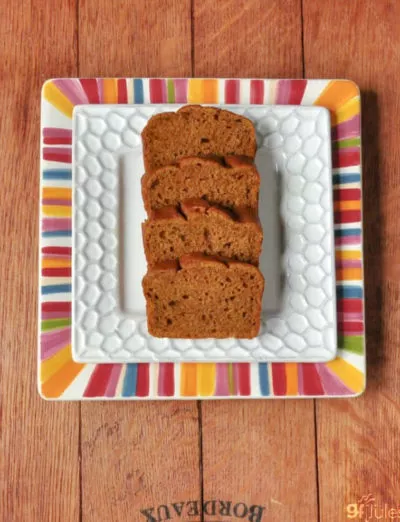
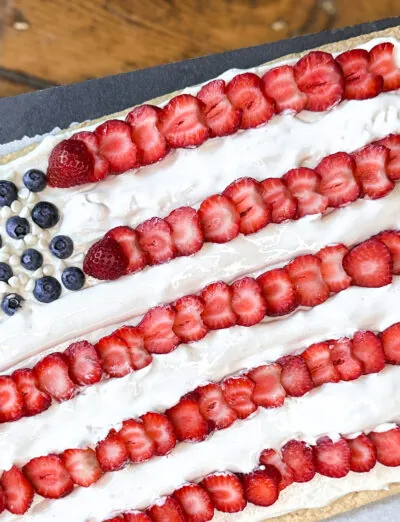
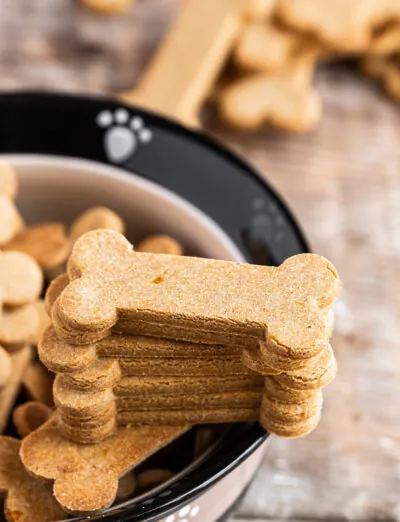


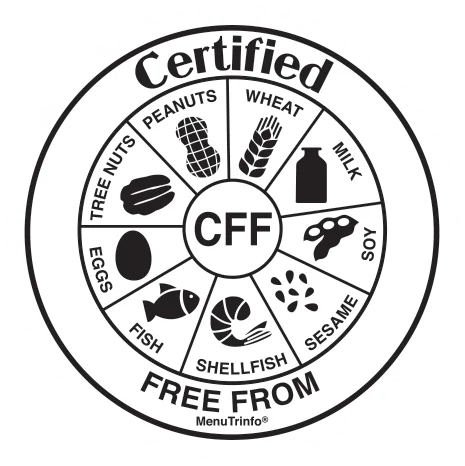


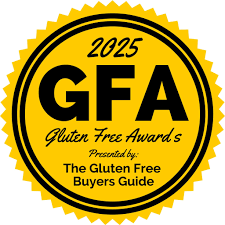

what kind of yogurt did you use?
Hi Suzanne, I’ve used almond, coconut and soy – they all work just fine.
Thanks for the recipe.I tried it and didn’t burn the naan! I ate it, but have to say that GF flours have a characteristic flavor that requires masking with herbs, spices, spreads, sauces, or soups.
Hi Carol – I’m glad you tried the recipe (and didn’t burn it LOL!). Next time try it with my flour, instead. It doesn’t have any taste at all, so it makes life so much easier because it doesn’t need to be masked. I totally know what you’re talking about with other gluten-free flours. Those aftertastes always bugged me, so I created a flour that tastes clean and all the flavors from your recipe can stand out!
Followed directions – still gummy inside. Did I make them too thick? Taste of outside layer is good so I’d like to make this work. For my daughter w.too many allergies to mention. Kept cooking longer, nothing changes the inside texture. Please advise…
They could have been too thick, or your oven temp is off. No other ingredient substitutions were made? They should definitely not be gummy on the inside, and certainly should have been fixed by cooking longer, if so. Send an email to Support@gfJules.com and we can walk through the recipe with you so you can get it right for your daughter!
Thanks for the response; I had forgotten to check for it! To answer your question, I didn’t substitute anything – followed recipe as written. This is the only bread recipe I can find that is vegan, GF, yeast free – which covers the biggies for my daughter. I don’t think it’s my oven, I’ve never had trouble with any other recipes. I will send an email per your suggestion – thanks again for the fast reply. Appreciate it.
Heather – when you email customer support, have them send you my yeast-free sandwich bread recipe. You can try an egg sub in that one – it’s a wonderful recipe!
I split these and cut into quarters. spread them on a cookie sheet inside up, sprayed them with olive oil and garlic powder and a little sea salt. I popped them in the oven until golden and served them with homemade hommus. They were fantastic! My son has been craving pita. He requests Arabic food all the time and I usually make crusty bread for him, but it is not the same as eating it with pita. Thank you!
Wonderful idea for pita points! Thanks so much for sharing, Alexis, and so glad my recipe will be put to good use in your family!
I was wondering if we could freeze the dough once mixed up or the finished product? 6 are too many for me at one time.
Hi Bonnie, you could freeze the dough if wrapped well, and then let it come to room temperature before spreading and baking. You could also freeze them once baked. Before freezing, I would suggest letting them cool and then pulling apart or cutting into the middle if you plan on using them as pita breads; otherwise just freeze once cooled. Enjoy!
great. thanks! BTW, I tell everyone I meet about your site and wonderful flour and mixes!! Thank you for doing all the legwork for us!!
Thanks so very much, Bonnie B! I’m just happy when my legwork is put to good use!
I’m looking all over your website for “nutritional facts”. I have to eat GF but also low GI. Almost all GF products are too high on the Glycemic index for me but was hoping your products wouldn’t be. Can you point me in the right direction Jules? Thanks!!
Thanks!!
Hi Jules – go to the link called “Nutritional Facts” under the “Jules’ Products” tab. There are links there for products. As for recipes, there are some that we have run nutritionals on, mostly the healthier ones. Search my blog for “healthy” and you should come up with some of those. Hope that helps!
Jules I was wondering also about the question further up about why you would use 2 different types of salt! Thanks! Love your products!
Thanks Beth! I’m so glad to hear that you’re loving my products! To answer the salt question, using coarse sea salt is not essential in this recipe, but it does help to form more air pockets in this dough. When the coarse sea salt begins to soften from the heat and liquid, steam is formed, creating more air pockets. Again, not essential in this particular recipe, but a nice touch.
I also am wondering , why two types of salt?
Hi Sharon – I answered the salt question for you right after Beth’s comment.
The Flatbread sounds awesome. In fact I am going to make some in a few minutes. Do you have a recipe to make “sub” type buns. That is what I miss most is Subway! Thanks for all your wonderful recipes and wonderful flour!
Hi Sharon – give this recipe a try: https://gfjules.com/gluten-free-life/. Enjoy!
Your recipe says to ‘warm’ the yogurt and milk. Can you be more specific? Is that in a pan on stove, bring to room temperature or ?
Thank you.
Hi Ilene, I actually warm it in the microwave to be slightly warmer than room temperature. Hope that helps!
Love your recipes and your products. However, please find a way for the recipes to be printed on 1-2pages without all the other “stuff”. I have had to recycle so many pieces of paper just trying to print a simple recipe. the helpful hints to the side did nothing to help me. I ended up with 4 pages for the flatbread recipe. It is easier and less stressful on the environment for me to hand write the recipe out by hand.
Hi Pam – so glad you’re loving my recipes and putting them to good use! I agree completely about the wasteful printing, which is why we added a tab at the top called “clean print.” With it, you can remove sections of introductory text, images, etc., and drastically reduce the printed pages. Hope that helps!
Clean print feature works great! Got it down to 1 page with just the ingredients and directions. However, most of the time I just take my laptop into the kitchen.
Julie, my question has nothing to do with this recipe. I live in Australia and I do not have access to your flour, so the question is: the flour mixture in your books calls for tapioca starch, but I absolutely hate the taste of it. I know it is an important component and it has a role in it, but could it be substituted with something else? (arrowroot is not easily find here, the one available is made of tapioca)
Hi Silvia, I’m sorry you cannot find arrowroot easily, as that is a decent substitute for tapioca starch. If you can discern the taste the tapioca starch that is available to you, try covering that amount with equal parts potato starch and cornstarch. The key is to use equivalent amounts of other starches. Best of luck!
What is the purpose of the two types of salt?
I’m wondering about that, too. I have different kinds of salt, but never really know when they are interchangeable.
Hi Christine – I answered the salt question for you after Beth’s comment. Hope that helps!
I am so excited to try this recipe I miss pita and hummus because pita and chips or crackers is just not the same! After these are baked are they freezable? I would probably make a huge batch and freeze them. Would they be best frozen before or after baking?
I miss pita and hummus because pita and chips or crackers is just not the same! After these are baked are they freezable? I would probably make a huge batch and freeze them. Would they be best frozen before or after baking?
I meant hummus and crackers or chips! I was trping to fast and over excited about gfree pita.
Oh I LOVE YOU! Thank you soooooooooooo much for this recipe! I actually just spoke with a dear dear friend of mine the other day who lives in GOA, INDIA… we were discussing if it were possible to do something like this and how.. She searched and searched online and could not find anything except of course the non tandoori oven Indian flatbread which has yeast in it.. You are a miracle worker! So appreciate this.. jumping up and down with delight.. hopefully can try making it this week.. Indebted to you… now hopefully, if those 2nd graders could make it, I can too!
Cathy B
It is difficult for me to find dairy-free and soy-free yoghurt. Is there a reliable sub I can use?
Shez – Can you locate dairy-free kefir or creamer? Those would be other possible options. Or use 1-2 Tbs. of honey (a humectant) plus the remainder of the cup of dairy-free milk — if the dough is too wet, add a bit more flour to make it less sticky. The yogurt provides some additional body to the dough and helps to keep it soft and fresh for longer – the honey should help offset this a bit if you aren’t able to use the yogurt.
“Where there’s a will, there’s a way!” I knew you’d find a workaround for the broken oven. This flatbread looks great, Jules! I can’t wait to include it in my ongoing gluten-free bread series.
This flatbread looks great, Jules! I can’t wait to include it in my ongoing gluten-free bread series. 
xo,
Shirley
Thanks, Shirley!!!
Fage Greek Yogurt? will that work?
Thanks!!
Suzann – Greek Yogurt will be fine here. If you find that the dough is too dry once mixed though, add 1-2 Tbs. of your milk; add more if you find it’s necessary, but that ought to be enough. Enjoy the recipe!
I just made these with Greek yogurt and they are a bit dry. I was thinking of decreasing the yogurt byt about a Tbs. and increasing the milk by that much. They taste good just didn’t puff up. Getting ready to start again!
Ah, Jules if these work you will be my hero, I love and have really missed true pita bread that splits and is chewy and crunchy both. these look amazing. I don’t have your flour blend so won’t blame you if the first ones aren’t quite as good as these look. I will be getting some of your flour as you seem to make some great things out of it.
I’m so glad you’re eager to try this recipe, cdrushin! All flour blends have very different properties, so please don’t give up on the recipe if the blend you are using doesn’t work. I hope you can try my flour soon, too!
Thank you sooooo much. I’ve missed eating pita breads.
Kris – I am so happy you’ll be enjoying this recipe and trying it soon!!!